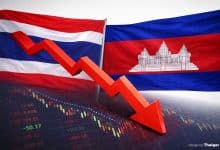Thailand’s commerce ministry aims for 20% cross-border trade boost

The Commerce Ministry of Thailand has an ambitious vision for the upcoming year – pushing cross-border trade value to 1.2 trillion baht, marking a 20% increase from this year’s estimated 1 trillion baht.
Deputy Commerce Minister Napintorn Srisunpang, the overseer of the Business Development Department, Trade Negotiations Department and Foreign Trade Department, disclosed the ministry’s strategy to achieve this. They plan to promote various community products, geographical indication products, and franchises.
Napintorn stated the ministry will also host exhibitions and business-matching events, creating a platform for officials from neighbouring nations and foreign trade associations to discuss trade barrier reduction strategies.
“All relevant government departments are working on a collective plan for border trade promotion. Border trade promotion activities are slated to start first in major border trade areas such as Chiang Rai, Mae Sot in Tak, Sadao-Padang Besar in Songkhla, Nong Khai, Surin and Buriram.”
Despite economic challenges in neighbouring countries like Myanmar, Laos, and Cambodia, the ministry remains optimistic. Napintorn expressed belief in the popularity of Thai consumer goods in these countries due to their quality and reasonable prices. He added, “We will also promote cross-border trade with China.”
The growth of small and medium-sized enterprises (SMEs) and boosting their export capabilities have been identified as crucial areas. Out of approximately two million registered companies in Thailand, only 900,000 are active.
Cross-Border Trade
Napintorn highlighted that last year’s cross-border trade performance, which saw a growth of 5.5% from 2021 to about 1 trillion baht, was largely driven by listed or large corporations. These entities accounted for up to 90% of the export value, with only 10% coming from SMEs. SME export income decreased by 6% over the past year.
Contrasting the contribution of SMEs in developed countries, which is 40 to 50% of GDP, with that of Thai SMEs, which is only 34%. Napintorn reported that he wants to increase SME export income so that SME contributions to GDP reach 35.2%.
As part of a broader strategy, Napintorn tasked the Trade Negotiations Department with accelerating the conclusion of negotiations on new free trade agreements (FTAs), with entities such as the European Free Trade Association, the EU, the United Arab Emirates, and Sri Lanka. The department will also explore talks with new partners like Bhutan, South Korea, and Israel, reported Bangkok Post.
Trade negotiation officials are set to meet with counterparts from Malaysia, Cambodia, Laos, China, and the UK through joint trade committees to hasten the resolution of cross-border trade barriers and expand market access. The department has also been assigned to study the pros and cons of FTAs with new markets in the Middle East, Africa and Latin America.
Follow more of The Thaiger’s latest stories on our new Facebook page HERE.
Latest Thailand News
Follow The Thaiger on Google News:


























